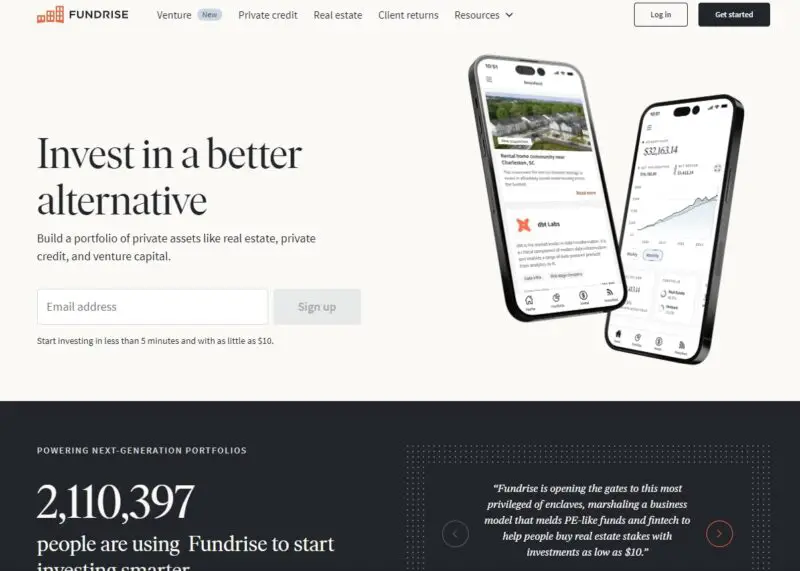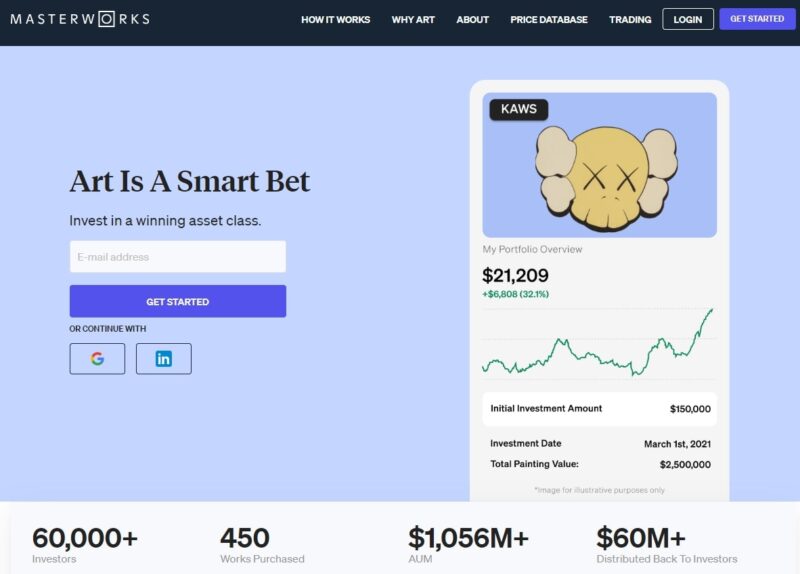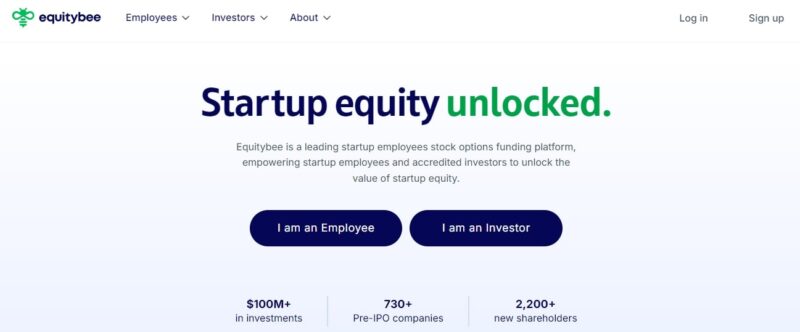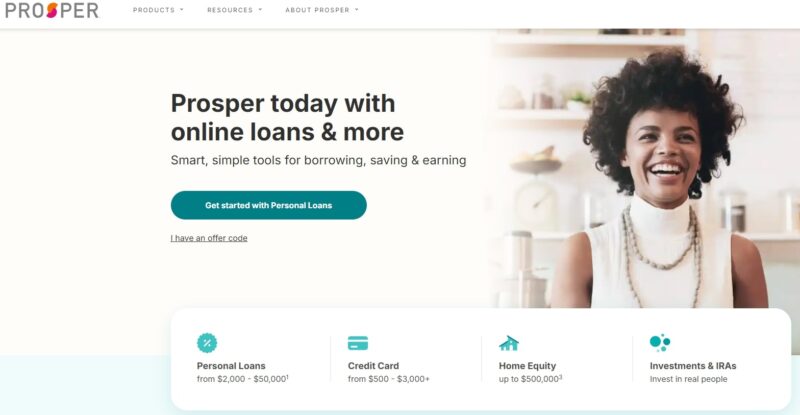Diversifying your investment portfolio is crucial for managing risk and maximizing returns. Traditional investments like stocks and bonds are well-known, but there are many other opportunities that can offer unique benefits.
In 2024, several investment funds stand out for their potential to diversify and strengthen your portfolio. These options provide various avenues to grow your wealth and create a better investment strategy. Here are the best alternative investment funds to consider for a well-rounded portfolio.
Table of Contents
ToggleThese Are the Best Alternatives to Stocks in 2024
- Real Estate
- Fine Art
- Collectibles
- Private Companies
- Venture Capital
- Farmland
- Cryptocurrency
- P2P Lending
1. Real Estate
Real estate is a proven investment option that can provide steady income and long-term appreciation. Unlike stocks, real estate offers tangible assets that can generate passive income through rental payments and potential capital gains from property appreciation.
How to Invest in Real Estate

Direct Ownership
- Purchase residential or commercial properties directly.
- Generate income through rental payments and benefit from property appreciation over time.
- Requires substantial capital for down payments and ongoing maintenance costs.
Real Estate Investment Trusts (REITs)
- Invest in publicly traded companies that own, operate or finance income-producing real estate.
- Offers liquidity similar to stocks, allowing investors to buy and sell shares easily.
- Provides exposure to diverse real estate portfolios with relatively low initial investment.
Crowdfunding Platforms

- Platforms like Fundrise and Yieldstreet pool funds from multiple investors to purchase real estate assets.
- Allow investors to participate in real estate projects with minimal initial capital.
- Offers access to commercial and residential properties without the hassle of property management.
Real Estate Mutual Funds and ETFs
- Invest in funds that hold portfolios of real estate-related assets.
- Provides diversification and professional management.
- Traded on major stock exchanges, offering liquidity and ease of access.
Why Real Estate is a Good Alternative to Stocks
1. Income Generation
Rental properties provide a steady stream of income, which can be more predictable than stock dividends.
2. Appreciation Potential
Real estate tends to appreciate over time, offering potential capital gains in addition to rental income.
3. Diversification
Adding real estate to an investment portfolio can reduce overall risk by spreading investments across different asset classes.
4. Inflation Hedge
Real estate values and rental income often rise with inflation, providing a natural hedge against inflation.
5. Tax Benefits

Real estate investors can benefit from tax deductions on mortgage interest, property depreciation, and maintenance expenses.
6. Tangible Asset
Real estate is a physical asset that can provide a sense of security and stability compared to the volatility of stocks.
2. Fine Art
Investing in fine art can provide significant returns and diversification for your portfolio. Unlike stocks, fine art offers a tangible and often appreciating asset that can be enjoyed while it increases in value.
It involves purchasing works by renowned artists, which can include paintings, sculptures, and other forms of visual art. These pieces often appreciate in value over time, providing both financial returns and aesthetic enjoyment.
How to Invest in Fine Art
Masterworks

- Fractional Ownership: Masterworks allows investors to buy shares in high-value art pieces, making fine art accessible without needing millions to purchase an entire piece.
- Diversified Portfolio: By investing in shares of multiple artworks, you can diversify within the art market itself, reducing risk.
- Liquidity: While traditional art investments require holding onto the piece for many years, Masterworks provides a secondary market for trading shares, offering better liquidity.
Art Galleries and Auctions
- Direct Purchase: Buy art directly from galleries or auctions. This requires significant capital and knowledge of the art market.
- Appraisal and Insurance: Ensure that your purchases are appraised for value and properly insured.
Art Funds

- Managed Investments: Art funds pool capital from multiple investors to buy and manage a portfolio of artworks. These funds are managed by experts who understand the market dynamics.
- Accessibility: Provides access to a diversified collection of art, managed by professionals, reducing the need for personal expertise in art valuation.
Why Fine Art is a Good Alternative to Stocks

Low Correlation with Markets
- Market Independence: The value of art typically does not move in tandem with stock markets, providing a hedge against market volatility.
- Stability: Art often retains its value even during economic downturns, offering portfolio stability.
High Appreciation Potential
- Historic Returns: Art has historically appreciated at rates comparable to or exceeding stocks, especially for works by established artists.
- Demand: High demand for rare and culturally significant pieces can drive significant price increases over time.
Tangible Asset
- Physical Enjoyment: Unlike stocks, art is a tangible asset that can be displayed and enjoyed, providing personal satisfaction alongside financial returns.
- Cultural Value: Art often holds cultural and historical significance, which can add to its intrinsic value.
Diversification
- Unique Asset Class: Adding art to your portfolio diversifies your investments beyond traditional financial assets, spreading risk.
3. Collectibles
Collectibles, such as rare coins, vintage cars, and trading cards, offer an exciting way to diversify your investment portfolio. These tangible assets can appreciate significantly over time and provide a unique investment opportunity beyond traditional financial markets.
Collectibles are items that have value due to their rarity, condition, and demand among collectors. These can include art, antiques, stamps, coins, comic books, vintage cars, and sports memorabilia. The value of collectibles often increases as they become rarer and more sought after.
How to Invest in Collectibles
Public

- Fractional Ownership: Public offers a platform where you can buy shares of high-value collectibles, making it easier to invest without purchasing the entire item.
- Wide Range of Assets: Invest in a variety of collectibles, from trading cards to rare coins, diversifying within the collectibles market.
Auction Houses and Dealers
- Direct Purchase: Buy collectibles directly from reputable auction houses or dealers. This requires substantial knowledge and expertise in the specific collectible category.
- Authentication: Ensure collectibles are authenticated and appraised to confirm their value and authenticity.
Collectible Funds

- Managed Investments: Funds pool capital from multiple investors to buy and manage a portfolio of collectibles. These funds are managed by experts who understand market trends and values.
- Diversification: Provides access to a diversified collection of collectibles, reducing the risk associated with investing in a single item.
Why Collectibles Are a Good Alternative to Stocks
Appreciation Potential
- High Returns: Many collectibles have shown significant appreciation over time, often outperforming traditional investments.
- Demand: High demand for rare items can drive up prices, leading to substantial capital gains.
Low Correlation with Markets
- Market Independence: The value of collectibles typically does not correlate with stock markets, offering a hedge against market volatility.
- Stability: Collectibles can retain their value even during economic downturns, providing portfolio stability.
Tangible Asset
- Physical Enjoyment: Unlike stocks, collectibles are tangible items that can be displayed and enjoyed, providing personal satisfaction alongside financial returns.
- Cultural Value: Collectibles often hold cultural and historical significance, adding to their intrinsic value.
Diversification
- Unique Asset Class: Adding collectibles to your portfolio diversifies your investments beyond traditional financial assets, spreading risk.
4. Private Companies

Investing in private companies allows you to access the potential high returns of businesses that are not publicly traded. This type of investment offers opportunities to support innovative startups and growing companies before they reach the stock market.
Private companies are businesses that have not gone public and are not listed on stock exchanges. These companies often seek funding from private investors to expand operations, develop new products, or enter new markets.
How to Invest in Private Companies
Equitybee

- Pre-IPO Equity: Equitybee allows investors to buy shares in private companies before they go public. This offers a chance to invest at a lower valuation than what might be available post-IPO.
- Access to High-Growth Companies: Invest in startups and tech companies with high growth potential, providing an opportunity for substantial returns.
Venture Capital Firms
- Managed Funds: Venture capital firms pool funds from multiple investors to invest in a portfolio of private companies. These firms are managed by professionals with expertise in identifying and supporting high-potential startups.
- Diversification: Investing through a venture capital firm provides access to a diversified portfolio, reducing the risk associated with investing in a single company.
Private Equity Funds

- Growth and Buyout Opportunities: Private equity funds invest in established companies with potential for growth or restructuring. These investments often involve significant capital and longer investment horizons.
- Professional Management: Funds are managed by experts who work closely with the companies to improve operations and increase value.
Why Private Companies are a Good Alternative to Stocks
High Return Potential
- Early-Stage Growth: Investing in private companies offers the potential for high returns as these businesses grow and expand. Early-stage companies can experience rapid value appreciation.
- Pre-IPO Opportunities: Buying shares before a company goes public can provide significant gains once the company lists on a stock exchange.
Portfolio Diversification
- Different Market Dynamics: Private companies operate in different market conditions compared to public companies, offering diversification and reducing overall portfolio risk.
- Non-Correlated Returns: The performance of private companies is often less correlated with public market trends, providing a hedge against stock market volatility.
Active Involvement
- Influence and Control: Investors in private companies often have more influence over business decisions and strategy compared to shareholders of public companies.
- Strategic Partnerships: Investing in private companies can lead to strategic partnerships and opportunities for collaboration, further enhancing returns.
Long-Term Investment Horizon
- Stable Growth: Private equity investments typically require a longer time horizon, aligning with the growth and development cycles of the companies. This can lead to more stable and substantial returns over time.
5. Venture Capital
Venture capital (VC) is a type of private equity focusing on investing in early-stage companies with high growth potential. It involves providing funding and support to startups and emerging businesses, often in technology and innovative sectors.
Venture capital involves investors providing capital to startups and small businesses with long-term growth potential. These investments are typically high-risk but offer the potential for substantial returns. Venture capitalists often take an active role in managing and advising the companies they invest in to help them grow.
How to Invest in Venture Capital
Venture Capital Funds

- Pooled Investments: Venture capital funds pool money from multiple investors to create a diversified portfolio of high-potential startups.
- Professional Management: These funds are managed by experienced professionals who identify promising companies, conduct due diligence, and provide ongoing support.
Direct Investment
- Angel Investing: Individual investors, known as angel investors, can invest directly in startups. This requires significant capital and a willingness to take on high risk.
- Syndicates: Platforms like AngelList allow smaller investors to participate in venture capital deals through syndicates, pooling their funds with others to invest in startups.
Online Platforms

- Equity Crowdfunding: Websites like SeedInvest and OurCrowd offer opportunities for individual investors to fund startups through online platforms, making venture capital more accessible.
- Yieldstreet: Provides access to venture capital investments alongside other alternative assets, offering a diversified approach to investing in high-growth companies.
Why Venture Capital is a Good Alternative to Stocks

High Return Potential
- Exponential Growth: Startups have the potential for rapid growth and significant appreciation in value, offering high returns for early investors.
- Successful Exits: Venture capital investments can lead to lucrative exits through acquisitions or initial public offerings (IPOs), providing substantial returns.
Portfolio Diversification
- Different Asset Class: Venture capital investments operate independently of public stock markets, offering a different risk and return profile.
- Sector Exposure: Investing in startups can provide exposure to cutting-edge technologies and innovative sectors not typically available through public markets.
Active Involvement
- Influence: Venture capitalists often play an active role in guiding and mentoring startups, providing strategic direction and resources.
- Network Access: Investors gain access to a network of entrepreneurs, industry experts, and other investors, which can provide additional opportunities and insights.
Economic Impact
- Innovation Support: Venture capital investments support innovation and entrepreneurship, contributing to economic growth and job creation.
- Community Development: By funding local startups, venture capital can have a positive impact on regional development and innovation ecosystems.
6. Farmland
Investing in farmland provides a unique opportunity to benefit from the agricultural sector, which has shown consistent returns and stability over time. Farmland investments can offer both income and appreciation, making it a valuable addition to a diversified portfolio.
Farmland investing involves purchasing agricultural land and leasing it to farmers or managing it for crop production. This type of investment generates income through lease payments or crop sales and benefits from the appreciation of land value over time.
How to Invest in Farmland
AcreTrader

- Crowdfunded Investment: AcreTrader allows investors to buy shares in farmland properties, making it accessible without needing to purchase an entire farm.
- Diversification: Invest in various types of farmland, including row crops, permanent crops, and specialty farms.
- Management Services: AcreTrader handles the management and leasing of the land, providing a passive investment opportunity.
Farmland REITs
- Publicly Traded: Real Estate Investment Trusts (REITs) focused on farmland provide a way to invest in agricultural land through the stock market.
- Income Generation: REITs pay dividends from the rental income of the farmland they own, offering a steady income stream.

Direct Ownership
- Purchase Farmland: Buy and manage farmland directly, either leasing it to farmers or operating it yourself. This requires significant capital and agricultural knowledge.
- Custom Farming: Hire professional farm managers to handle the day-to-day operations, providing a more hands-off approach while retaining ownership.
Why Farmland is a Good Alternative to Stocks
Consistent Returns
- Stable Income: Farmland generates regular income through lease payments or crop sales, offering a reliable revenue stream.
- Appreciation: The value of farmland has historically appreciated over time, providing capital gains in addition to income.
Low Volatility
- Market Independence: Farmland values are less correlated with stock market fluctuations, offering stability and reducing overall portfolio risk.
- Inflation Hedge: Agricultural land values and crop prices often rise with inflation, protecting against the eroding effects of inflation on investment returns.
Tangible Asset
- Physical Ownership: Farmland is a tangible asset that can provide a sense of security and stability compared to the volatility of stocks.
- Land Utilization: Farmland can be used for various agricultural purposes, including crop production, livestock, and specialty farming.
Environmental and Social Impact
- Sustainable Agriculture: Investing in farmland can support sustainable farming practices and contribute to food security.
- Community Benefits: Farmland investments can support rural economies and local communities, providing employment and economic growth.
7. Cryptocurrency
Cryptocurrency investment involves buying digital currencies, which use cryptographic technology for secure transactions. This asset class has gained significant attention due to its high growth potential and the revolutionary technology behind it.
Cryptocurrency investing involves purchasing digital currencies like Bitcoin, Ethereum, and others. These currencies operate on decentralized networks based on blockchain technology, providing secure and transparent transactions without the need for intermediaries like banks.
How to Invest in Cryptocurrency
Bitcoin IRA
- Retirement Accounts: Bitcoin IRA allows investors to include cryptocurrencies in their retirement accounts, providing tax advantages and long-term growth potential.
- Diverse Offerings: Invest in a variety of cryptocurrencies beyond Bitcoin, including Ethereum, Litecoin, and others.
- Security: Offers robust security measures to protect your investments from hacks and fraud.

eToro

- User-Friendly Platform: eToro provides an easy-to-use interface for buying, selling, and trading cryptocurrencies.
- Social Trading: Features social trading options where you can follow and mimic the trades of successful investors.
- Wide Selection: Offers a broad range of cryptocurrencies, from major coins like Bitcoin and Ethereum to smaller, emerging tokens.
Cryptocurrency Exchanges
- Direct Purchase: Platforms like Coinbase, Binance, and Kraken allow you to buy and sell cryptocurrencies directly.
- Trading: Advanced trading features for more experienced investors, including margin trading and futures contracts.

Cryptocurrency Funds
- Managed Investments: Funds like Grayscale Bitcoin Trust offer exposure to cryptocurrencies through a traditional investment vehicle.
- Diversification: Provides access to a diversified portfolio of digital assets, managed by professionals.
Why Cryptocurrency is a Good Alternative to Stocks
High Growth Potential
- Rapid Appreciation: Cryptocurrencies have shown significant price appreciation, with early investors in Bitcoin and Ethereum seeing substantial returns.
- Innovative Technology: The underlying blockchain technology has the potential to revolutionize various industries, adding to the growth potential of cryptocurrencies.
Diversification
- Non-Correlated Asset: Cryptocurrencies often move independently of traditional markets, providing a hedge against stock market volatility.
- Global Reach: Digital currencies operate on a global scale, offering exposure to international markets and economic trends.
Accessibility
- 24/7 Trading: Cryptocurrency markets operate 24/7, providing flexibility for investors to trade at any time.
- Low Barriers to Entry: With the ability to buy fractional amounts, investors can start with small capital and gradually increase their investment.
Innovation and Future Potential
- Decentralized Finance (DeFi): The rise of DeFi platforms is creating new financial services and products, expanding the use cases for cryptocurrencies.
- Adoption: Increasing adoption by institutions and businesses enhances the legitimacy and utility of digital currencies, driving long-term growth.
8. P2P Lending

Peer-to-peer (P2P) lending platforms connect individual borrowers with investors, bypassing traditional financial institutions. This investment option offers high-interest returns and the opportunity to support small businesses and personal loans directly.
P2P lending involves lending money to individuals or businesses through online platforms that match lenders with borrowers. Investors earn interest on the loans they provide, often at rates higher than those offered by traditional savings accounts or bonds.
How to Invest in P2P Lending
LendingClub
- Individual Loans: LendingClub allows investors to fund personal loans, receiving monthly payments of principal and interest.
- Diversification: Spread investments across multiple loans to mitigate risk. LendingClub offers tools to automate and diversify investments.
- Risk Assessment: Borrowers are rated based on creditworthiness, helping investors make informed decisions.
Prosper

- Personal and Business Loans: Prosper offers a platform for investing in personal and small business loans.
- Automated Investing: Prosper’s automated investing feature allows you to set criteria for loans and automatically invest in those that meet your requirements.
- Transparency: Detailed loan performance data helps investors track and manage their investments effectively.
Funding Circle
- Small Business Loans: Specializes in providing loans to small businesses. Investors can earn returns by funding these business loans.
- Risk Mitigation: Provides thorough risk assessments and detailed financial profiles of borrowing businesses.
- Historical Performance: Offers transparency in historical loan performance, aiding investors in making data-driven decisions.
Why P2P Lending is a Good Alternative to Stocks

High-Interest Returns
- Competitive Rates: P2P lending platforms often offer higher interest rates compared to traditional fixed-income investments.
- Monthly Income: Provides regular income through monthly interest payments, enhancing cash flow.
Diversification
- Low Market Correlation: P2P loans are less correlated with stock market performance, offering diversification benefits.
- Broad Investment Opportunities: Invest in a variety of loans across different credit grades and borrower types to spread risk.
Social Impact
- Direct Support: Enables direct support to individuals and small businesses, contributing to community growth and economic development.
- Transparency: Detailed borrower profiles and loan performance data increase transparency, allowing investors to make informed decisions.
Accessibility
- Low Entry Barrier: Many platforms allow investments with relatively low minimum amounts, making P2P lending accessible to a wide range of investors.
- Ease of Use
Other Interesting Options
Exploring Next-Gen Coins: The Future of Cryptocurrency Investing
Next gen Coins represent a cutting-edge segment of the cryptocurrency market, offering investors a chance to participate in the evolution of blockchain technology and digital finance. Unlike traditional cryptocurrencies like Bitcoin and Ethereum, next-gen coins focus on innovative use cases, enhanced scalability, and energy-efficient consensus mechanisms, making them an attractive alternative for forward-thinking investors.
One key advantage of next-gen coins is their ability to address the limitations of first-generation cryptocurrencies. Many of these coins leverage advanced blockchain architectures, such as proof-of-stake (PoS) or delegated proof-of-stake (DPoS), which significantly reduce energy consumption while maintaining robust security and decentralization. Additionally, next-gen projects often focus on interoperability, enabling seamless communication and value exchange between different blockchain networks.
Next-gen coins also unlock new opportunities in decentralized finance (DeFi), gaming, and the metaverse. For instance, tokens linked to decentralized applications (dApps) can provide access to innovative financial services, from lending platforms to tokenized real estate. In the gaming sector, these coins enable players to own in-game assets as NFTs (non-fungible tokens), creating real-world value for virtual items.
Investing in next-gen coins offers significant growth potential but also comes with inherent risks. As with any emerging technology, careful research and diversification are crucial. Platforms like Smart Options provide insights into the most promising next-gen coins, helping investors identify high-potential projects in this rapidly evolving market.
Wine
Investing in wine has gained popularity due to its potential for high returns and the enjoyment of owning fine vintages. Wine investments can appreciate significantly as certain vintages become rarer and more sought after over time.
How to Invest in Wine

- Vinovest: Vinovest offers a platform for investing in wine collections. You can buy and store wines with professional management, and Vinovest provides insurance and authentication for your investments.
- Vint: Vint allows fractional investment in wine collections, making it accessible to investors with smaller capital. Each collection is SEC-qualified, ensuring regulatory compliance.
Benefits of Wine Investing
- Tangible Asset: Wine is a physical asset that can be enjoyed and appreciated.
- High Returns: Historical data shows that fine wines have appreciated at rates comparable to traditional investments.
- Diversification: Wine investments often move independently of stock markets, providing portfolio diversification.
Commodities
Commodities like gold, oil, and agricultural products offer another way to diversify an investment portfolio. These raw materials are essential to various industries and can provide a hedge against inflation.
How to Invest in Commodities
- Futures Contracts: Directly invest in commodities through futures contracts, which allow you to buy or sell a commodity at a predetermined price at a future date.
- ETFs and Mutual Funds: Exchange-traded funds (ETFs) and mutual funds offer a way to invest in a basket of commodities, providing diversification within the commodity sector.
- Physical Commodities: Purchase physical commodities like gold bars, silver coins, or agricultural products. This requires secure storage and insurance.
Benefits of Commodity Investing
- Inflation Hedge: Commodities often rise in value with inflation, protecting your investment from inflationary pressures.
- Diversification: Commodities have a low correlation with traditional financial markets, reducing overall portfolio risk.
- High Demand: As essential resources, commodities are always in demand, providing stability and growth potential.
Local & Small Businesses

Investing in local and small businesses supports economic growth and can provide high returns. These investments often involve direct involvement with the businesses, giving investors a closer connection to their investments.
How to Invest in Local & Small Businesses
- Mainvest: Mainvest is a platform that allows you to invest in local businesses through revenue-sharing agreements. You can support small businesses like breweries, restaurants, and retail shops.
- Crowdfunding: Platforms like Kickstarter and Indiegogo enable you to fund small business projects in exchange for equity or rewards.
- Direct Investment: Partner with local entrepreneurs to invest directly in their businesses, providing capital in exchange for equity or a share of profits.
Benefits of Investing in Local & Small Businesses
- Community Impact: Supporting local businesses helps create jobs and stimulate economic growth in your community.
- High Potential Returns: Small businesses often have significant growth potential, offering high returns on investment.
- Personal Satisfaction: Investing in businesses you believe in and watching them grow can be personally rewarding.
Last Words
Exploring various alternative investment funds is a valuable strategy for diversifying your portfolio in 2024. These options offer unique opportunities outside traditional markets, providing avenues for significant growth and stability. Each alternative investment can enhance your financial strategy and contribute to a more balanced and resilient portfolio.
Related Posts:
- Seed Funding Explained - Prepare, Pitch and Get…
- FarMart Secures Investment from Swiss Firm ResponsAbility
- Top 7 Best SMG in COD Mobile 2025 – Best Picks for Ranked
- How To Grow Your Startup Without External Capital -…
- How To Do SEO for Your Startup Website - Search…
- How to Validate Your Startup Idea - Idea Screening Explained










